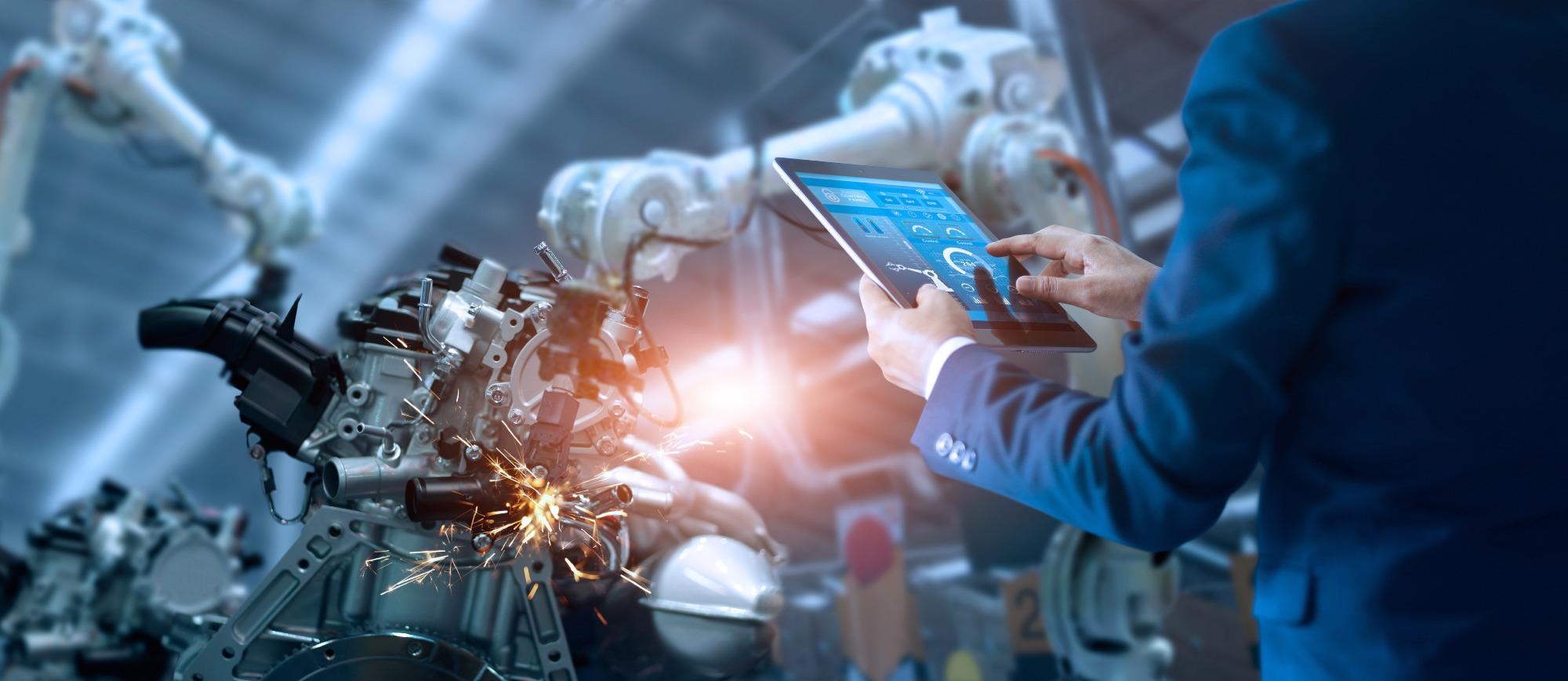
Image Credit: Shutterstock.com/ PopTika
Nigel Smith, managing director of Shibaura Machine – formerly Toshiba Machine/TM Robotics – claims that an emboldened robotics revolution could be reignited if countries around the world take advantage of simplified robot programming.1
Industry 4.0 is the ongoing automation of traditional manufacturing and industrial practices using innovative smart technologies. In the wake of the 2008 financial crisis, governments came up with new initiatives so that manufacturers could reorganize and improve digitalization in their processes.
New strategic initiatives that began in Germany, geared towards driving manufacturing forwards through improvements in digitization, is what led to the initial conception of the term, Industry 4.0 - a term that was ratified in 2011 during the Hannover Fair after the German government and its industrial partners completed a follow-up project.
In around 2017, the UK jumped on board with the launch of the ‘Building a Britain Fit for The Future’ white paper.2 This industrial strategy sets out a long-term plan to boost productivity through the adoption of AI technology and business automation.
However, as some countries are clearly embracing digitalization, others are still getting to grips with new and evolving smart technologies and robotics. Thus, despite the investment encouraging digitalization in manufacturing, some industry sectors are still lagging behind.
Whilst large-scale industries, including automotive and pharmaceutical manufacturers, have embraced automation to improve productivity, mid-scale and small-scale manufacturers have not been so quick on the uptake. Therefore, the challenge is introducing these smaller companies to automation to encourage the use of advanced robotics.
Simplifying the Challenge
To take on this challenge, industrial robots need to be accessible to all manufacturers, particularly where user experience and cost come into effect. Reportedly, most end-users consider simple programming features the most important factor when making a robotics-based decision.1
With more than 1500 programming languages in current usage, it is near-impossible for the most experienced robot engineer to learn them all. Yet, at a time when the global Covid-19 pandemic dominates global markets, digitalization and advanced simplified programming could pave the way to a new robotics revolution.
Typically, BASIC and Pascal are the first programming languages most robot programmers are introduced to but they are arguably outdated, or no longer suited to the demands of today’s robotic applications.
However, Shibaura Machine’s engineers are trained using the programming language SCOL, which bears some resemblance to BASIC but offers more advanced features.
Shibaura’s latest robotic software - TSAssist - has been specifically developed with usability in mind, offering intuitive screen design and operator panels that can be customized. Newcomers to the software will find it readily accessible as it simplifies many of the common users experience challenges.
TSAssist is compatible with any of TM Robotics’ industrial robots, including the extensive SCARA, Cartesian and six-axis ranges.
Nigel Smith, Managing Director of Shibaura Machine
Shaping the Future
With the demand for simplified robotics programming increasing, digitalization yields the data needed to train the robots and automated systems. Therefore, to keep trends on the upswing and attract small- and mid-sized businesses to the robotics table, robot manufacturers must allay any concerns where system complexity is an issue.
With some businesses moving towards easy-to-program collaborative robot models, or ‘cobots’, users aren’t fully aware of their limitations when it comes to repetitive, heavy-duty tasks. Thus, cobots are not considered a complete alternative to traditional industrial robots which can handle dangerous heavy-duty tasks.
However, the current trends predict that cobots could make up 34% of the robotics market by the year 2025. Therefore, robot manufacturers must ensure that their technology is fully accessible by making them easy-to-program while leveraging advanced digital technologies and digitized data.
In a post-pandemic world where economic recovery is front and center, digitalization remains a key element that will provide more and more opportunities and help shape the future and advance the robotics sector, worldwide.
References and Further Reading
1. https://www.pandct.com/news/reclaiming-the-revolution-simplified-programming-could-improve-global-robotics-adoption
2. https://www.gov.uk/government/publications/industrial-strategy-building-a-britain-fit-for-the-future
Disclaimer: The views expressed here are those of the author expressed in their private capacity and do not necessarily represent the views of AZoM.com Limited T/A AZoNetwork the owner and operator of this website. This disclaimer forms part of the Terms and conditions of use of this website.